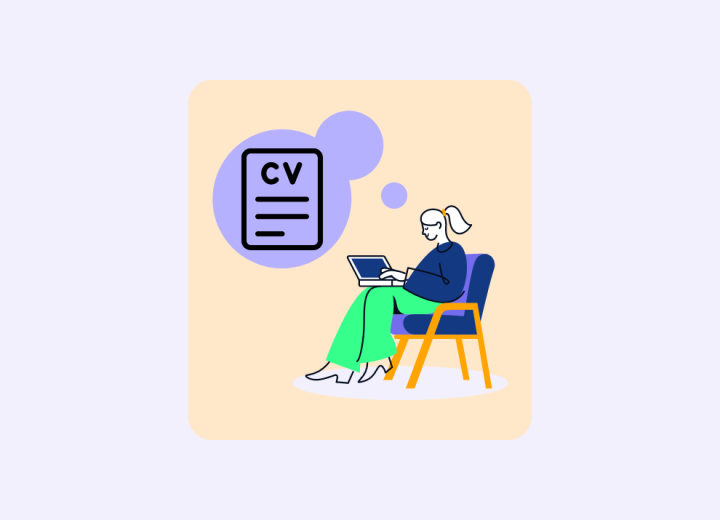- School Programs & Apprenticeships: On-the-job paid (less than full-time) training in which you’ll work with their actual employees to gain the necessary skills to take your career in your desired direction.
- Pre-Internships: Early career programs (mostly unpaid) that range from a day to a few weeks to know more about the inner workings of JPMorgan financial models.
- Internships: A 12-week to 1-year paid program in which you work on meaningful projects to learn about the products and services that the company offers to their clients and who their actual customers are.
- Full-Time Roles: Competitively paid 24-36 months full-time roles for undergraduate, postgraduate, PhD- and MBA-level candidates.
To join JPMorgan Chase as an aspiring investment banking professional, you must go through four stages of the interview process. Let’s discuss each of them below:
1. Online Application
The first step is to head to the dedicated webpage of JPMorgan Chase for students and young graduates, click Our hiring programs, and click on any of the four categories mentioned above to find the opportunity that attracts you the most.
Then, click Apply Now. Enter your email address, personal details, academic details, resume, cover letter, and submit the online application.
Next, the recruitment team will review your application, and if they think you have what it takes, they will invite you for preliminary assessment tests.
Note: In a few cases, the JPMorgan Chase hiring team may not even look at your resume and still ask you to do these tests first.
2. Pymetrics Test
Pymetrics online test at JPMorgan Chase is a set of neuroscience-based games, 12 to be exact, that lasts for 25-35 minutes and are designed to assess you on 90 different cognitive and emotional traits, including:
- Planning speed
- Multitasking abilities
- Decision making
- Adaptability
- Memory span and others.
Important: Failing on the Pymetrics test means you can’t retake it for another year.
You might also be asked to complete a short numerical or verbal reasoning test so the recruiters can assess your analytical and comprehension skills.
As soon as you complete these tests successfully, you’ll get an email inviting you to a video interview (HireVue). This means the company is interested in you but not sure what you can bring to the table.
3. Video Interview (HireVue)
In the HireVue video interview, you’ll record your responses to a series of pre-set questions. You’ll be asked 3-5 questions, which you have a couple of minutes to prepare, and then you have to answer them within 2-3 minutes on camera.
These can be a mix of behavioral questions (e.g., about teamwork, leadership, and problem-solving) and technical questions related to finance and investment banking (e.g., valuation methods, market trends, etc).
4. Final In-Person Interviews (Superday)
If you perform really well in the Pymetrics test and HireVue interview, you’ll be shortlisted for a final round of back-to-back interviews at a JPMorgan Chase office. For entry-level positions at the firm (internships and graduate hires), this is referred to as a “Superday.”
These interviews last about 25-40 minutes; usually, two interviewers are there to question you in each of them.
After completing the Superday, the hiring team reviews feedback from all interviewers and decides which candidates will receive offers.
What Is the Timeline for the Recruiting Process at JPMorgan Chase?
The timeline for the recruiting process at JPMorgan Chase for students and fresh graduates is usually 5 months (from the opportunities available to the final offer letter for internships and full-time roles). Here’s the breakdown.
- June-August: Applications for summer internships and full-time analyst positions typically open in early to mid-summer. Deadlines for these roles are usually in August or early September.
- Start of September: Pymetrics test.
- Mid of September: HireVue video interview.
- End of September to early November: Superday.
- October-November: The offer letter given in October, and the deadline to accept it is November.
After you accept the offer, JPMorgan Chase will go through your onboarding process in January and February.
The recruitment process timeline for School Programs & Apprenticeships and Pre-internship is usually one month from the date of the application submission.
What Questions Should You Expect in JPMorgan Chase Interviews?
The questions you will be asked in different stages of the JPMorgan Chase interviews might be overwhelming. Therefore, below are a few examples to let you test the waters and hint you to prepare for what’s to come:
Pymetric Test (Games)
Example 1 (Risk Tolerance):
Objective: You are shown a balloon that you can "pump" to increase its size and earn money. The larger the balloon gets, the more money you earn, but the balloon can pop at any time, causing you to lose the money.
What It Measures: This game assesses your risk tolerance and decision-making under uncertainty. It looks at how far you're willing to go to maximize rewards, balancing the potential for gain against the risk of loss.
Example 2 (Reaction Time and Attention):
Objective: In this game, you are asked to press the space key on the keyboard quickly whenever a specific stimulus appears on the screen.
What It Measures: This game tests your reaction time, attention to detail, and ability to focus under pressure.
Video Interview (HireVue)
HireVue is an asynchronous interview used by JPMorgan Chase to screen candidates initially. Here are some of the questions asked in this interview, which are then reviewed by recruiters:
- Explain the steps involved in performing a DCF analysis, including projecting free cash flows, calculating the discount rate, and determining the terminal value.
- Discuss the three main financial statements and explain how changes in one affect the others.
- Define WACC, describe its components, and explain how it's used in valuation.
- How do you value a company using different valuation methods?
- What is the impact of a $10 increase in depreciation on the Financial Statements?
- Define enterprise value and explain how it's calculated.
- What would you do if you were given incomplete information for a Financial Model?
👉 For more technical questions to practice, check out our guide with sample questions.
Final Interviews (Superday)
The Superday in JPMorgan Chase interview process is particularly for roles in investment banking, asset management, and other high-stakes areas of the company. It’s an intense, full-day event where you face a series of interviews with senior executives and team members. Following are a few example questions you will be asked in this final stage:
- What is the difference between equity value and enterprise Value?
- Provide a recommendation for a specific stock, including your analysis of the company, industry, financials, and why you believe it's a good investment.
- You have two potential investment opportunities: One with higher risk and return and the other with lower risk and return. Which would you choose and why?
- Walk me through a recent deal in which JPMorgan Chase was involved. What was your opinion on it?
- How would you approach valuing a company in a distressed situation?
Fit Questions Asked in JPMorgan Chase HireVue and Final Interviews
Along with the investment banking questions, the recruits will ask you different fit and behavioral questions during the HireVue and final interviews on Superday. Below are some example questions:
- Why Investment Banking?
- Why JPMorgan Chase?
- Tell me about a time you demonstrated leadership when faced with a conflict in a team.
- Give an example of a time you worked under pressure and met a tight deadline.
- Make a sales pitch for any investment product you are interested in.
- What’s your biggest weakness?
- Why should we choose you?
👉 Prepare for your interview using our Stress Question Tool.
How To Prepare for JPMorgan Chase Interviews?
The acceptance rate of JP Morgan Chase when hiring students and fresh graduates for investment banking roles is in the low single digits, often ranging between 1% and 3%. So thorough preparation is of utmost importance:
- Know JPMorgan Chase: Study the firm's history, culture, values, recent deals, and its position within the banking industry. Be prepared to discuss why you want to work there specifically.
- Market Knowledge: Stay updated on current events in the financial markets, interest rate changes, major economic indicators, and recent high-profile deals.
- Use the STAR Method: Structure your answers to behavioral questions using the Situation, Task, Action, Result (STAR) framework. This ensures your answers are clear and demonstrate your problem-solving skills.
- Mock Interviews: Do practice runs with a friend or coach who has experience in investment banking.
- Understand Macro and Microeconomics: Have a good grasp of economic principles that affect markets and corporate finance.
- Practice Calculations: Be able to perform mental math quickly and accurately, as well as explain the reasoning behind financial calculations. Our mental math tool can help you with this 😉.
- HireVue Video Interview: Prepare concise answers to common questions in the HireVue video interview and practice them in a timed format to simulate the experience.
- Insightful Questions: Prepare thoughtful questions that demonstrate your knowledge of the industry and interest in the role.
- Dress Professionally: Make sure your interview attire is professional and appropriate for the role.
- Rest and Stay Confident: Get a good night’s sleep before the interview and maintain confidence throughout the process.
Key Takeaways:
That’s it! You’ve got the lowdown on cracking your JPMorgan Chase interview. Remember, it’s not just about feeling confident about knowing your stuff but also about showing your passion for finance and how you can fit into the JPMorgan Chase team. That’s not a hidden fact that practice makes perfect, so don’t ever miss out on this part. Good luck, you’ve got this!




